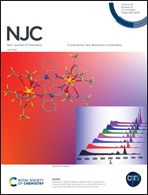Fischer–Tropsch synthesis using a cobalt catalyst supported on graphitic carbon nitride
Abstract
In the present work, the performance of cobalt catalysts on a graphitic carbon nitride (g-C3N4) support in Fischer–Tropsch synthesis (FTS) is studied. The g-C3N4 support was synthesized using three different precursors: urea (GNU), melamine (GNM) and a urea–melamine mixture (GNMU). Then, the cobalt catalysts were prepared by an impregnation method. The obtained catalysts were carefully characterized by nitrogen adsorption–desorption, FTIR, TGA, TPR, FESEM, TEM, HRTEM and XRD techniques. The TPR results show that nitrogen atoms in the g-C3N4 support improved cobalt reduction. FTS activity and product selectivity studies show that the Co/GNU catalyst with the smallest cobalt particle size has the greatest cobalt time yield (CTY). The FTS activity and selectivity towards light products of cobalt supported on g-C3N4 are higher than cobalt supported on carbon nanotubes (Co/CNTs). It is concluded that the electron-donor properties of nitrogen atoms in the g-C3N4 support increased the reducibility of cobalt oxides in the reduction process and also caused the formation of short-chain hydrocarbons in FTS.



 Please wait while we load your content...
Please wait while we load your content...